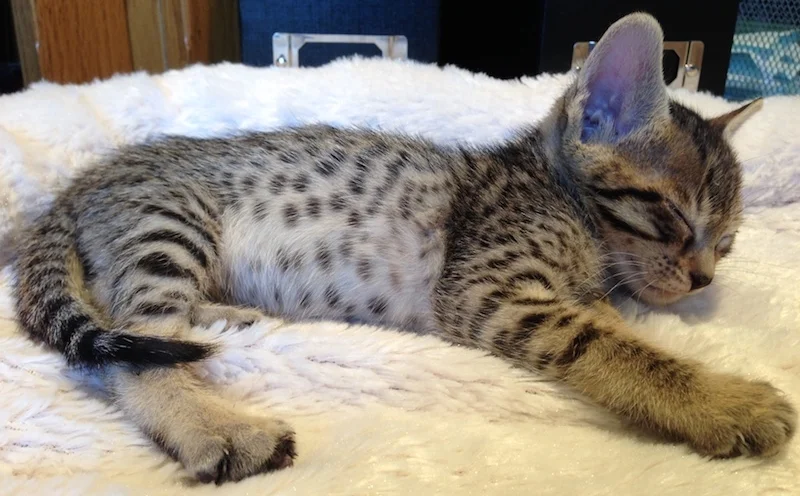Almost Time to Bring Kitty Home
Now that we are ending the major developmental stages in a kittens life, it is time to prepare them for their new home. In weeks nine through twelve, we will go through what is necessary for them to leave the nest.
Livin' It Up
Now the kittens are fully weaned, litter box trained, and look more like adult cats. They won't be having any major growth spurts in the next few weeks but rather filling out and gaining muscle tone. Their baby teeth should all be in place and their eyes should be changing to their permanent color. They are moving their body more similar to an adult which includes a hunting like behavior and pouncing on their fellow litter-mates. Also, they start reacting to certain substances like cat grass and catnip. This is the time you really can interact with them and introduce them to other pets and friends. Cat trees are also recommended at this time because their nails should be at the point of needing cut. This shouldn't be much of an issue as long as you have messed with their paws enough as young kittens. I think the easiest way is to grab a friend and one hold while the other cuts, or since I am alone most of the time when doing this I just sit them in my lap for a mani-pedi.
Vaccines and Surgery Time
Most say that 10 weeks old is safe for spay and neuter and this is true. However, we like to spay and neuter our kittens at 12 weeks. The reason for this is because when the kittens get taken to the vet we do not want them to think the vet is a bad place. This being said we like to give the rabies vaccination, spay or neuter, blood work, and any other vaccine or testing all done at the same time while they are under anesthesia. When they wake up they will not remember all of the extra things done so it's not so bad. They get a cozy home for the night with a treat and get to come home the next morning. By 12 weeks all of our kittens will have had their FVRCP vaccines, spayed or neutered, first-year rabies vaccination, dewormed, microchipped, and the first month of Revolution for prevention. Between 13 and 14 weeks the kittens should be ready for their new home. We keep them for an additional ten days to see out the healing process of surgery but other than that they are ready to go.
My New Home
When adopting a kitten, it is important to have your home ready for your new baby. Depending on where you are adopting your kitten from you will need to check with your breeder, veterinarian, or local shelter to help prepare for the new kitten. A few things you might ask would be:
What type of food has my kitten been eating? This is important. If you all of a sudden change the type of food they are eating it can easily upset their bellies and cause loose stool.
How often is my kitten being fed and what times? Remember the kittens do best on a schedule so for the first few weeks try and gradually adjust them to your lifestyle and what will work best for you long term.
What kind of litter is my kitten used to? Make sure that the kittens only use a natural non-clumping litter.
Can I have some sort of toy, blanket or towel that my kitten has had to keep my kitten comfortable when coming to its new home? When your kitten arrives at its new home it is going to be much different from what it has been used to. Smell, noises, tastes. It is nice for the kitten to have something that is familiar to it from before so it can help calm their nerves and realize its new home isn't so bad after all.
These are just some basic things to ask for when adopting a new kitten. We also recommend that you keep the kitten in a small area at first so it doesn't get lost. Keep a litter box, food, and water dish nearby so it isn't scared to use the potty or get something to snack on. It is also important to keep the kitten warm. Being in a new environment can cause the kitten stress. When kittens stress their immune systems can weaken making it easier for them to catch a cold or get sick. Staying warm can help with that and we use small heating pads for all of our kittens. They like it nice and cozy. And most important have fun with your new kitten. Once it gets settled in it will be full of energy and wanting lots of attention!
I will go into more detail about preparing your home for your new kitten in a later blog post but this gives you a pretty good idea.




